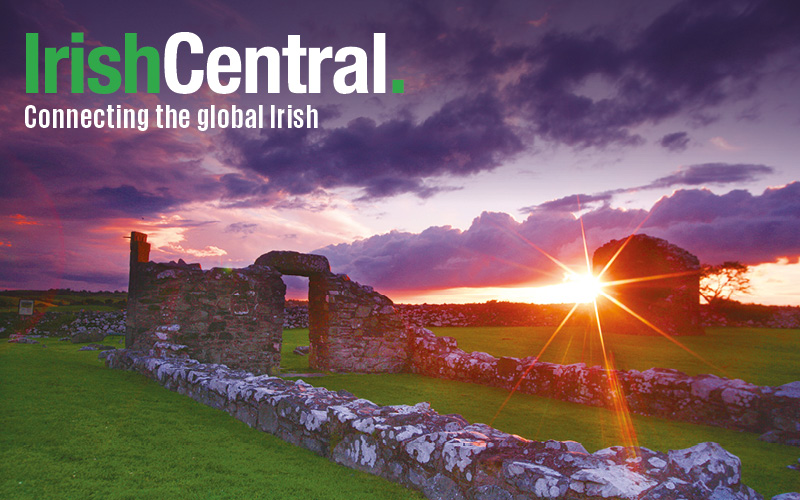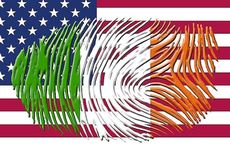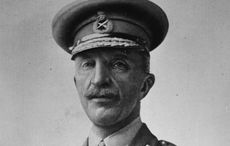| Patrick Clifford |
Patrick Clifford’s second solo album, Chance of a Start, showcases the talents of one of the most compelling singer/songwriters that has crossed my path in many a moon!
After seeing him years ago in the legendary New York group Four to the Bar, I recently encountered Clifford at an open mic night during an Irish American Writer’s Salon in New Jersey. A woman had just finished an oral storytelling piece about going to a Bruce Springsteen show, and Clifford followed it up with a haunting read of “Thunder Road.”
“This is a classic immigrant/emigration story, about busting out of your surroundings,” he said as an introduction. He then broke the song apart and spliced the DNA of melody to suit him, demonstrating an uncanny ability to make any song his own.
This master of interpretation then bore down hard on his acoustic guitar to create a stirring rendering of the Pogues “Thousands Are Sailing” from If I Should Fall From Grace with God.
On Chance of a Start, he weaves hand drums, piano and fiddle to create a reflective read of the trad staple “The Parting Glass.” His voice is crisp with a hint of melancholy that is a prerequisite for any good Irish balladeer.
Fans of Glen Hansard and Christy Moore will love Clifford, especially his version of “The Auld Triangle.” He re-imagines six classics by 20th century Irish and folk songwriters such as Pete St. John, Ewan MacColl and Dominic Behan, revitalizing them for a new generation, lest they be forgotten or (worse yet) fall into irrelevance for a lack of thoughtful stewardship.
“This music is living; it is not for a museum,” he told NJ.com recently. “The songs that I choose to sing are songs that are worth singing, they are worth people hearing, their stories are a kind of literature. The ones that don’t speak to me, I don’t sing.”
Clifford is not just an interpreter of other songwriters. He does a fine job crafting stories of his own in the four tracks he penned on Chance of a Start.
On “The Morning Sun,” the sunny acoustic alt-country arrangement hides the down-on-his-luck character. “Rent’s late again, skies are all gray/You wish you could be 100 miles away/If you only had the money you’d go/She’s complaining again, about this, that, and drinking,” he sings before a convergence of bluegrass, harmonica and Irish fiddle provides an uplifting bridge to the other side.
Clifford is active in the western New Jersey music scene, with regular gigs at the River Blue Cafe in Frenchtown and Mitchell’s Cafe in Lambertville as well as a busy session schedule. He also hosts a Celtic music program on WDVR, a local radio station on the FM dial. For everyone else, log onto www.patrickclifford.com to hear the best new artist you haven’t heard yet.
I spoke with Clifford about the new album and his influences. Here’s how it went:
How would you describe your sound to someone who has never heard it?
I've heard Irish people sing American, and I've heard American people sing Irish, and I don't really feel like it's either of those, exactly. But if I said "Irish-American," what would that mean? Like everyone, I'm expressing the accumulation of my experience. So there's a lot of New York in there, specifically growing up in El Barrio, and there's summers in Kerry, the thrill of arriving and the agony of leaving.
There's suburban American teenage angst, there's a large chunk of those heady days from the 1990s when I played with Four to the Bar, before all the Irish went back home to pet the Celtic Tiger. And now I would be kidding myself if I didn't admit to a middle-aged perspective creeping in.
On a more practical level, there's a difference between the live sound and the recorded sound. There always has been -- in the sense that, in just about every band I've ever recorded with, there was the argument about whether the recording should sound like the live band. My opinion has always been that live performance has advantages that recordings don't -- facial expressions and body language, for example -- and I don't think anyone would argue that it would be absurd, maybe impossible, to not use them during a show.
To me, the reverse is just as clearly a no-brainer -- that is, let the recording delight the listener in any way possible, regardless of what the live show delivers.
What artists have influenced your work?
Always a dangerous question to answer. You're always going to forget someone, and more to the point, there's so much that you're drawing on when you play in a tradition like ours that you're always going to invite a challenge.
I'm on firm ground naming Christy Moore for the way he covers songs in such a way that you'd never guess they weren't his own. I like the way that Paul Brady has moved so elegantly between rock and folk arrangements over the course of his career.
Martin Hayes and Dennis Cahill are quietly bringing dynamics and nuance into the tradition in the same way that the Pogues (loudly) brought headlong energy.
In terms of songwriting I admire a lot of Irish and English writers such as Christy, Shane MacGowan and Ewan MacColl, but I think my influences have been mostly American -- Bob Dylan, Bruce Springsteen, Tom Waits, Steve Earle, Paul Westerberg.
What can people expect from your live shows?
You can expect a good bit of trad when I have a fiddler with me. You can expect me to play your requests if I know them.
But if you're looking for the green beer, corned beef and cabbage stuff, you'll have to request it because I never go out planning to sing it. You should not, under any circumstances, expect me to sing "The Unicorn."
Left to my own devices, I would probably spend my time performing legacy material, songs that I think will be around for a long time, and will contribute to what's coming next in this tradition.
I like the stuff that feels like literature -- you know, when you finish some stories, close some books, and have to gasp for breath? I look for songs that do that to you.
Or songs that make your heels stamp on their own, or make you want stay up past your bedtime with a pair of headphones on, or better yet, make you want start an Irish band.
I also like to illustrate the commonalities among Irish and American, traditional and modern, folk and rock -- which, by the way, is part of what I tried to capture on Chance of a Start.




Comments